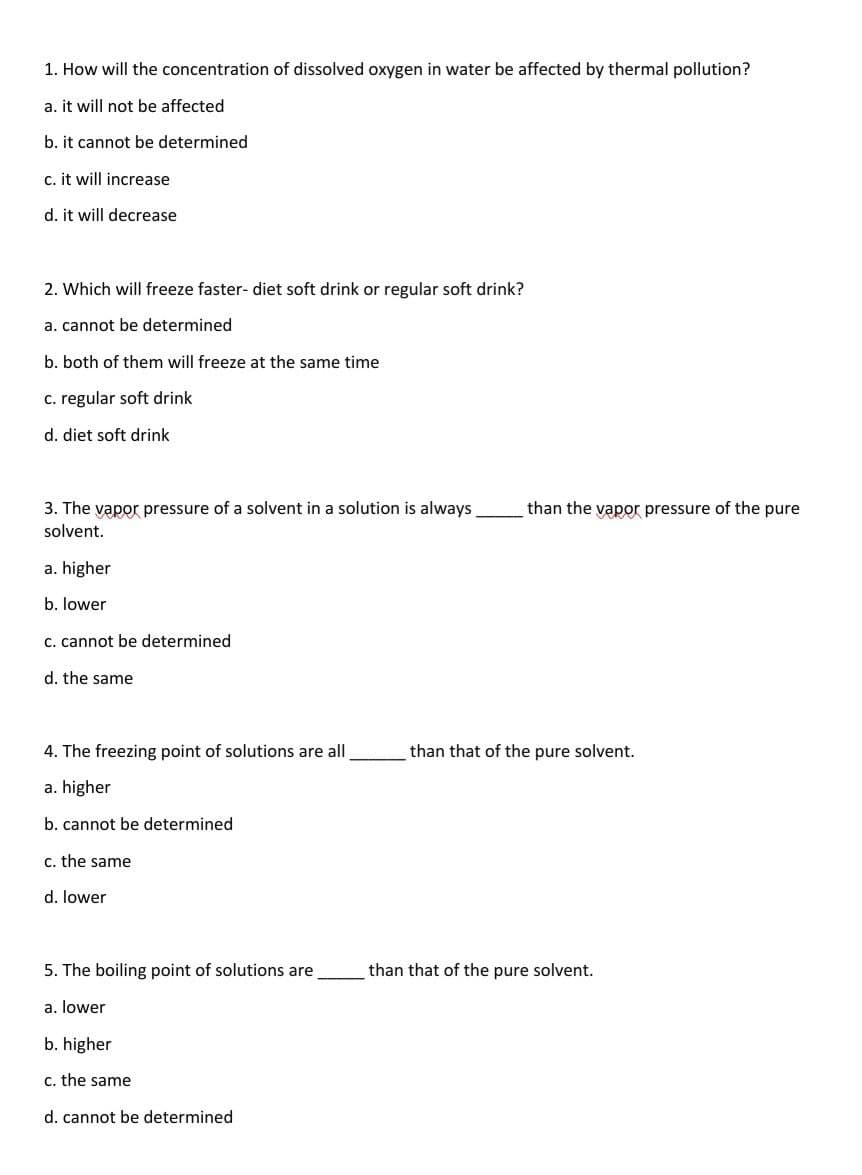1. How will the concentration of dissolved oxygen in water be affected by thermal pollution? a. it will not be affected b. it cannot be determined c. it will increase d. it will decrease
1. How will the concentration of dissolved oxygen in water be affected by thermal pollution? a. it will not be affected b. it cannot be determined c. it will increase d. it will decrease
Chemistry & Chemical Reactivity
9th Edition
ISBN:9781133949640
Author:John C. Kotz, Paul M. Treichel, John Townsend, David Treichel
Publisher:John C. Kotz, Paul M. Treichel, John Townsend, David Treichel
Chapter13: Solutions And Their Behavior
Section: Chapter Questions
Problem 75GQ: If a volatile solute is added to a volatile solvent, both substances contribute to the vapor...
Related questions
Question

Transcribed Image Text:1. How will the concentration of dissolved oxygen in water be affected by thermal pollution?
a. it will not be affected
b. it cannot be determined
c. it will increase
d. it will decrease
2. Which will freeze faster- diet soft drink or regular soft drink?
a. cannot be determined
b. both of them will freeze at the same time
c. regular soft drink
d. diet soft drink
3. The vapor pressure of a solvent in a solution is always
solvent.
than the vapor pressure of the pure
a. higher
b. lower
C. cannot be determined
d. the same
4. The freezing point of solutions are all
than that of the pure solvent.
a. higher
b. cannot be determined
c. the same
d. lower
5. The boiling point of solutions are
than that of the pure solvent.
a. lower
b. higher
c. the same
d. cannot be determined
Expert Solution
This question has been solved!
Explore an expertly crafted, step-by-step solution for a thorough understanding of key concepts.
Step by step
Solved in 2 steps

Knowledge Booster
Learn more about
Need a deep-dive on the concept behind this application? Look no further. Learn more about this topic, chemistry and related others by exploring similar questions and additional content below.Recommended textbooks for you

Chemistry & Chemical Reactivity
Chemistry
ISBN:
9781133949640
Author:
John C. Kotz, Paul M. Treichel, John Townsend, David Treichel
Publisher:
Cengage Learning

Chemistry & Chemical Reactivity
Chemistry
ISBN:
9781337399074
Author:
John C. Kotz, Paul M. Treichel, John Townsend, David Treichel
Publisher:
Cengage Learning

General Chemistry - Standalone book (MindTap Cour…
Chemistry
ISBN:
9781305580343
Author:
Steven D. Gammon, Ebbing, Darrell Ebbing, Steven D., Darrell; Gammon, Darrell Ebbing; Steven D. Gammon, Darrell D.; Gammon, Ebbing; Steven D. Gammon; Darrell
Publisher:
Cengage Learning

Chemistry & Chemical Reactivity
Chemistry
ISBN:
9781133949640
Author:
John C. Kotz, Paul M. Treichel, John Townsend, David Treichel
Publisher:
Cengage Learning

Chemistry & Chemical Reactivity
Chemistry
ISBN:
9781337399074
Author:
John C. Kotz, Paul M. Treichel, John Townsend, David Treichel
Publisher:
Cengage Learning

General Chemistry - Standalone book (MindTap Cour…
Chemistry
ISBN:
9781305580343
Author:
Steven D. Gammon, Ebbing, Darrell Ebbing, Steven D., Darrell; Gammon, Darrell Ebbing; Steven D. Gammon, Darrell D.; Gammon, Ebbing; Steven D. Gammon; Darrell
Publisher:
Cengage Learning

Chemistry: Principles and Reactions
Chemistry
ISBN:
9781305079373
Author:
William L. Masterton, Cecile N. Hurley
Publisher:
Cengage Learning


Chemistry: Principles and Practice
Chemistry
ISBN:
9780534420123
Author:
Daniel L. Reger, Scott R. Goode, David W. Ball, Edward Mercer
Publisher:
Cengage Learning